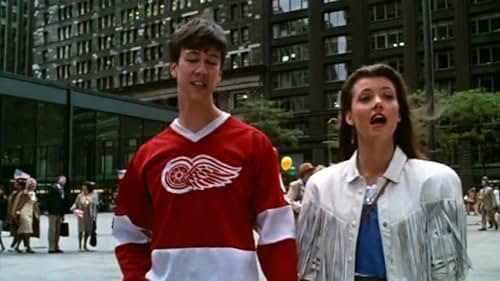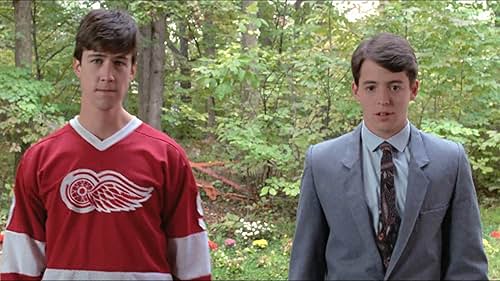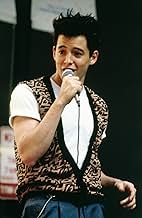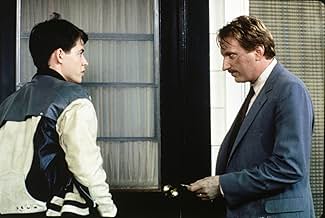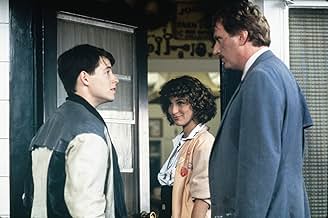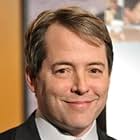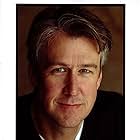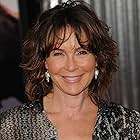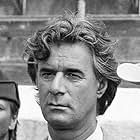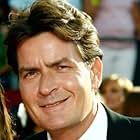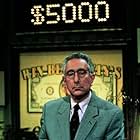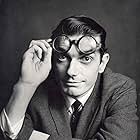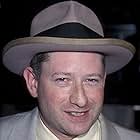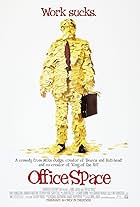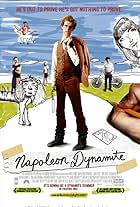A brash, cocky high school senior, tired of skipping school to spend a boring day at home, is determined to enjoy an epic day roaring around his favorite Chicago sites, enlisting his best fr... Read allA brash, cocky high school senior, tired of skipping school to spend a boring day at home, is determined to enjoy an epic day roaring around his favorite Chicago sites, enlisting his best friend and girlfriend to join him on the adventure.A brash, cocky high school senior, tired of skipping school to spend a boring day at home, is determined to enjoy an epic day roaring around his favorite Chicago sites, enlisting his best friend and girlfriend to join him on the adventure.
- Awards
- 3 wins & 1 nomination total
Scott Coffey
- Adams
- (as T. Scott Coffee)
- Director
- Writer
- All cast & crew
- Production, box office & more at IMDbPro
Storyline
Did you know
- TriviaDuring the parade, several of the people seen dancing (including the construction worker and the window washer) originally had nothing to do with the film. They were simply dancing to the music being played, and John Hughes found it so humorous that he told the camera operators to record it.
- GoofsWhen Ferris is running home, his shoes change from dress shoes (saying goodbye to Sloane) to canvas tennis shoes (running down the sidewalk) to running shoes (through his neighbor's house and back yard) and back to dress shoes (confronted by Rooney at the back door).
- Crazy creditsFollowing the conclusion of the end credits, Ferris comes out of bathroom and notices the viewer is still here.
- Alternate versionsOriginal DVD release is largely devoid of bonus features, but does include a John Hughes commentary. The later "Bueller...Bueller Edition" adds in many more bonus features, but omits the earlier Hughes commentary.
- ConnectionsEdited into Yoostar 2: In the Movies (2011)
Featured review
Like Back to the Future, Ferris Bueller's Day Off seems to hold a pretty firm and entrenched place in whatever 1980s teen cannon that people hold in such high regard. Back to the Future was, perhaps famously, rejected by many-a studios on the basis of 'not being raunchy enough'; something other films of its ilk were at the time. I can imagine something similar happening to Ferris Bueller's Day Off, but like Back to the Future, it is the decidedly 'un-raunchy' films of the era that we now revisit the most often and just seem to hold in higher regard.
I think what keeps this film resonating with past and current audiences alike is its clear distinction in paying close attention to young people, and their ever-ongoing battle for independence, for recognition and for individuality. The lead is Ferris Bueller (Broderick); a young and very confident, almost borderline sociopathic in his behaviour, male in then-contemporary America. Ferris is the sort of guy who can con his way into an expensive restaurant; hack his way into the school computer mainframe and shows total disregard to his friend's and certain respective situations when trying to haggle the use of a rare and classic car for the day. The film takes special care in introducing him as an individual whom lives in a large, detached house in a rich neighbourhood that comes complete with a white picket fence. He is literate in all the latest gadgets and pieces of technology, be it home computers used to hack or stereo systems to further the notion he is unwell.
In direct opposition to Ferris is the principal of Ferris' school, named Ed Rooney (Jones). Rooney isn't just out to capture Bueller as he plays truant, he is out to destroy Bueller's life; this, Rooney outlines as his goal very early on in the piece. This seems to be the essence of what keeps audiences old and new consistently discovering the film; that study of 'old vs. young' as these cocky, smart and quite attractive bunch of confident oddball kids dare stand up to those of a high authority; those that are grey, suit-clad authoritarian figures such as Rooney.
But I think Bueller is smarter-still than what he lets on. He talks very early on about how important it is to go to college and learn a trade and live the American Dream, but he does so in a very nonchalant manner, almost as if he is repeating what it is he's told to say, or think, or feel. What follows is a chain of events and total disregard to most things that suggest he isn't of this ideation at all. But the journey does have an ideation; an ideation Bueller himself cooks up to do with being able to notice life and enjoy life as best you can, otherwise it might seem like it's passing you by.
But the film isn't preoccupied with just these studies. Its attention to young vs. old or independence vs. routine is similarly played about with through one of Bueller's two friends named Cameron Frye (Ruck), who is given a slight subplot to do with being able to stand up to his father. Ferris and Cameron's third friend is Sloane Peterson (Sara), Ferris' girlfriend. The three complete an unusual triangle of pals; they are one another's' friend as well as foil, forever getting into adventures and situations but hitting the odd wall when it comes to the finer things during the day out. Cameron is forever concerned with the car; Cameron and Sloane are forever worried they might get caught (particularly when Ferris partakes in a large musical number in the street) and Ferris seems forever pre-occupied that the three of them will not get the best out of their day off; a day off Ferris sees as a gift, as something they worked hard towards earning with their scheming, and thus; must embrace it as fully as possible.
The film is a love story, a comedy that relies on slapstick, situation and screwball alike; the film is an odd beast of basic convention, surrealist humour and truancy glorification. But does it ever focus too much on one thing? Does it particularly care what you might think of it? I don't think it does, it just throws mostly everything at the screen, stirs it all up and allows it all to play out. It feels like two, or possibly three, different films at once – but that's fine because there is enough different sorts of content all brewing at once, and focused on at a balanced rate, that we go with it. One might say the film's attitude echoes that of its lead; it's doing things its own way, in its own style and doesn't particularly mind how you react. It's the kind of film that can go from a slow motion shot of two guys driving a sort-of stolen car that was sort-of stolen in the first place to the Star Wars theme; to a series of scenes that rely on a school teacher falling over a few times as a source of humour. The best thing about it all, is that it's all actually rather effective.
I think what keeps this film resonating with past and current audiences alike is its clear distinction in paying close attention to young people, and their ever-ongoing battle for independence, for recognition and for individuality. The lead is Ferris Bueller (Broderick); a young and very confident, almost borderline sociopathic in his behaviour, male in then-contemporary America. Ferris is the sort of guy who can con his way into an expensive restaurant; hack his way into the school computer mainframe and shows total disregard to his friend's and certain respective situations when trying to haggle the use of a rare and classic car for the day. The film takes special care in introducing him as an individual whom lives in a large, detached house in a rich neighbourhood that comes complete with a white picket fence. He is literate in all the latest gadgets and pieces of technology, be it home computers used to hack or stereo systems to further the notion he is unwell.
In direct opposition to Ferris is the principal of Ferris' school, named Ed Rooney (Jones). Rooney isn't just out to capture Bueller as he plays truant, he is out to destroy Bueller's life; this, Rooney outlines as his goal very early on in the piece. This seems to be the essence of what keeps audiences old and new consistently discovering the film; that study of 'old vs. young' as these cocky, smart and quite attractive bunch of confident oddball kids dare stand up to those of a high authority; those that are grey, suit-clad authoritarian figures such as Rooney.
But I think Bueller is smarter-still than what he lets on. He talks very early on about how important it is to go to college and learn a trade and live the American Dream, but he does so in a very nonchalant manner, almost as if he is repeating what it is he's told to say, or think, or feel. What follows is a chain of events and total disregard to most things that suggest he isn't of this ideation at all. But the journey does have an ideation; an ideation Bueller himself cooks up to do with being able to notice life and enjoy life as best you can, otherwise it might seem like it's passing you by.
But the film isn't preoccupied with just these studies. Its attention to young vs. old or independence vs. routine is similarly played about with through one of Bueller's two friends named Cameron Frye (Ruck), who is given a slight subplot to do with being able to stand up to his father. Ferris and Cameron's third friend is Sloane Peterson (Sara), Ferris' girlfriend. The three complete an unusual triangle of pals; they are one another's' friend as well as foil, forever getting into adventures and situations but hitting the odd wall when it comes to the finer things during the day out. Cameron is forever concerned with the car; Cameron and Sloane are forever worried they might get caught (particularly when Ferris partakes in a large musical number in the street) and Ferris seems forever pre-occupied that the three of them will not get the best out of their day off; a day off Ferris sees as a gift, as something they worked hard towards earning with their scheming, and thus; must embrace it as fully as possible.
The film is a love story, a comedy that relies on slapstick, situation and screwball alike; the film is an odd beast of basic convention, surrealist humour and truancy glorification. But does it ever focus too much on one thing? Does it particularly care what you might think of it? I don't think it does, it just throws mostly everything at the screen, stirs it all up and allows it all to play out. It feels like two, or possibly three, different films at once – but that's fine because there is enough different sorts of content all brewing at once, and focused on at a balanced rate, that we go with it. One might say the film's attitude echoes that of its lead; it's doing things its own way, in its own style and doesn't particularly mind how you react. It's the kind of film that can go from a slow motion shot of two guys driving a sort-of stolen car that was sort-of stolen in the first place to the Star Wars theme; to a series of scenes that rely on a school teacher falling over a few times as a source of humour. The best thing about it all, is that it's all actually rather effective.
- johnnyboyz
- Jun 10, 2009
- Permalink
Details
- Release date
- Country of origin
- Official site
- Languages
- Also known as
- Un experto en diversiones
- Filming locations
- Ben Rose Auto Museum - 370 Beach Street, Highland Park, Illinois, USA(Cameron's house and Ferrari garage)
- Production company
- See more company credits at IMDbPro
Box office
- Budget
- $6,000,000 (estimated)
- Gross US & Canada
- $70,136,369
- Opening weekend US & Canada
- $6,275,647
- Jun 15, 1986
- Gross worldwide
- $70,739,525
- Runtime1 hour 43 minutes
- Color
- Sound mix
- Aspect ratio
- 2.39 : 1
Contribute to this page
Suggest an edit or add missing content


